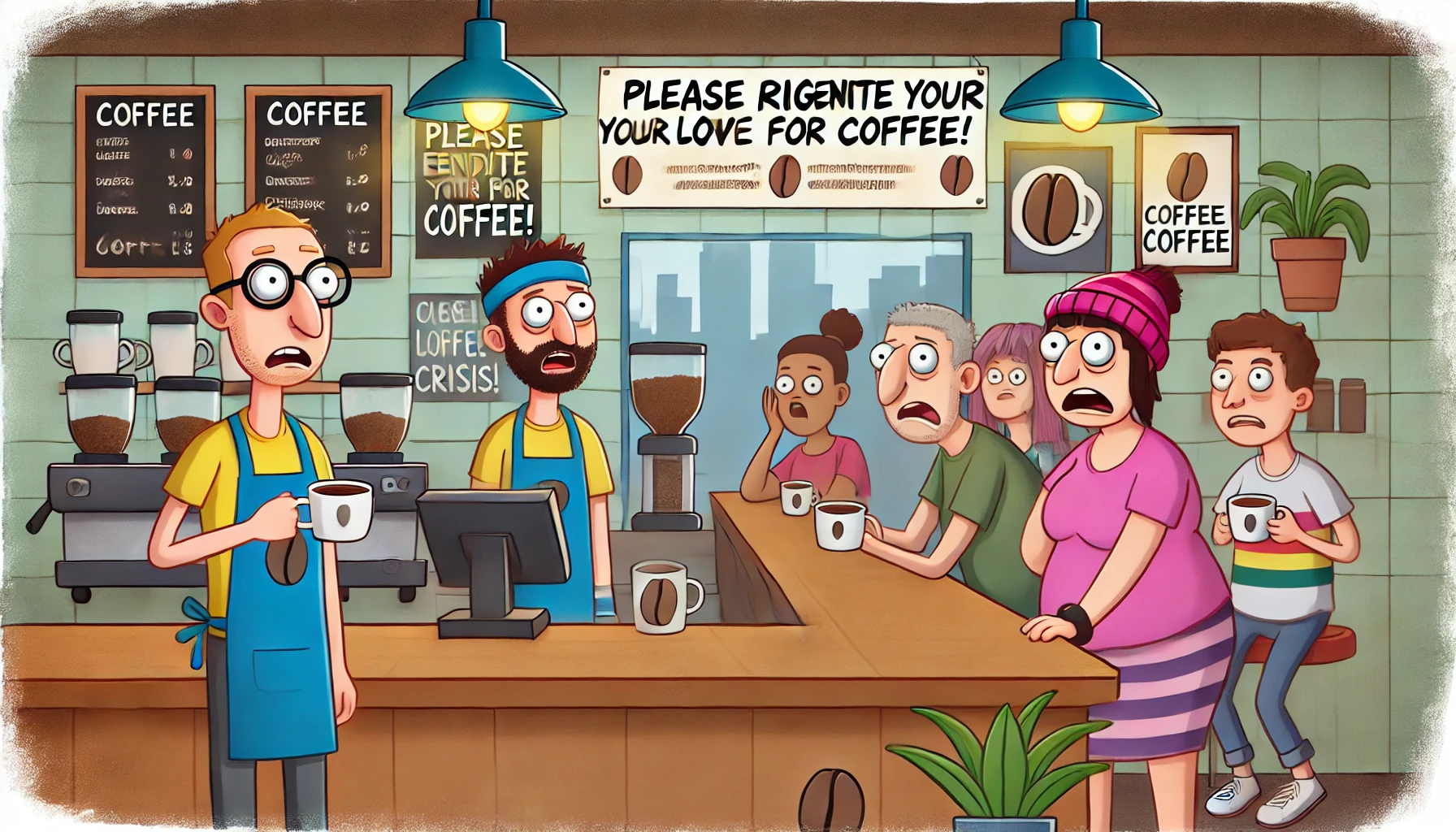Geneva, Switzerland – In a shocking turn of events, the International Caffeine Research Council (ICRC) has issued an urgent warning that the world is facing a potential “Coffee Enthusiasm Crisis.” Despite no shortages of actual coffee beans, scientists are raising the alarm that global enthusiasm for coffee may be dangerously low, threatening the entire industry as we know it.
The Crisis at Hand
The report, published this week, revealed a significant drop in the once-unshakable global obsession with coffee. According to researchers, enthusiasm levels for the beloved beverage have plummeted by 20% over the past year, with signs that many are no longer as excited about their daily cup of joe as they once were.
Dr. Juan Arabica, head of the ICRC, explained the gravity of the situation: “People are still drinking coffee, but they’re not enjoying it with the same fervor. We’ve detected fewer Instagram posts featuring latte art, fewer debates about which roast is superior, and a general decline in the number of people claiming coffee as their ‘entire personality.’ This is a serious issue.”
Symptoms of Declining Coffee Passion
In the report, researchers outlined the warning signs of this enthusiasm crisis:
- The Rise of “It’s Just Coffee” Sentiment: More and more people are treating coffee as a simple beverage, rather than a sacred ritual that requires 15 minutes of contemplation and social media documentation.
- Less Time for Coffee Photoshoots: Cafés are reporting a sharp drop in customers arranging their cappuccinos into aesthetically pleasing flat lays for Instagram. “It’s concerning,” said one barista. “People are just drinking their coffee… like it’s normal or something.”
- Decline in Fancy Orders: Fewer people are ordering elaborate drinks with half-a-dozen instructions. “We’ve seen a decrease in requests for double-decaf-soy-milk-half-sweet-pumpkin-spice-lattes with extra foam and a drizzle of caramel,” said a café owner in London. “Now they just ask for… coffee.”
What’s Behind the Decline?
Experts believe that coffee fatigue is setting in, especially among millennials and Gen Z, who have been bombarded with coffee culture since birth. “There’s only so much artisanal cold brew a person can drink before they start asking if it’s all worth the hype,” said social scientist Dr. Brewster Latte.
Another factor is the rise of new wellness trends, like matcha, kombucha, and mushroom lattes, which have lured some coffee enthusiasts away. “People are branching out,” said Dr. Latte. “It’s like the world woke up one day and said, ‘Maybe coffee isn’t the only thing that can make me feel alive.’”
Cafés Fight Back
In response, coffee shops around the globe are scrambling to reignite passion for the bean. Some are introducing “Extreme Coffee Experiences,” where customers can grind their own beans using a 16th-century hand-cranked mill, while others are creating “Immersive Espresso Journeys,” where every sip is accompanied by a live poetry reading about the history of caffeine.
One café in Berlin has even started offering “Therapy Sessions” for customers who are feeling emotionally distant from their usual morning cup. “It’s important to reconnect with your coffee,” said session leader Sasha Mocha. “We encourage customers to really feel their drink—emotionally, spiritually, and physically.”
The Impact on Coffee Culture
Coffee influencers, who have built entire careers around their love of the drink, are reportedly in crisis mode. “It’s terrifying,” said one well-known influencer, @BrewBabe23. “I used to get 10,000 likes on a picture of me holding a flat white. Now I’m lucky if people comment. Are we really losing our love for coffee?”
Social media platforms have seen fewer coffee hashtags as well. #CoffeeAddict, once a top trending tag, has seen a 30% decline in usage, with many former coffee influencers turning to alternative beverages like oat milk smoothies and turmeric shots to maintain their audience.
What’s Next?
The ICRC is urging people to rediscover their love for coffee before it’s too late. “We’re calling for a global coffee celebration,” Dr. Arabica said. “It’s time to revisit what makes coffee special—the smell of freshly ground beans, the sound of milk frothing, and the life-changing experience of a perfectly timed caffeine buzz.”
In the meantime, cafés are offering discounts on espresso shots and launching campaigns to remind people that coffee is more than just a drink—it’s a lifestyle. “Don’t give up on coffee just yet,” pleaded one café owner in New York. “We can still make coffee great again.”
As the world waits to see if the enthusiasm for coffee can be revived, one thing is certain: the stakes have never been higher. Because, without coffee, what’s left to fuel the modern world? Matcha?
No thanks.




